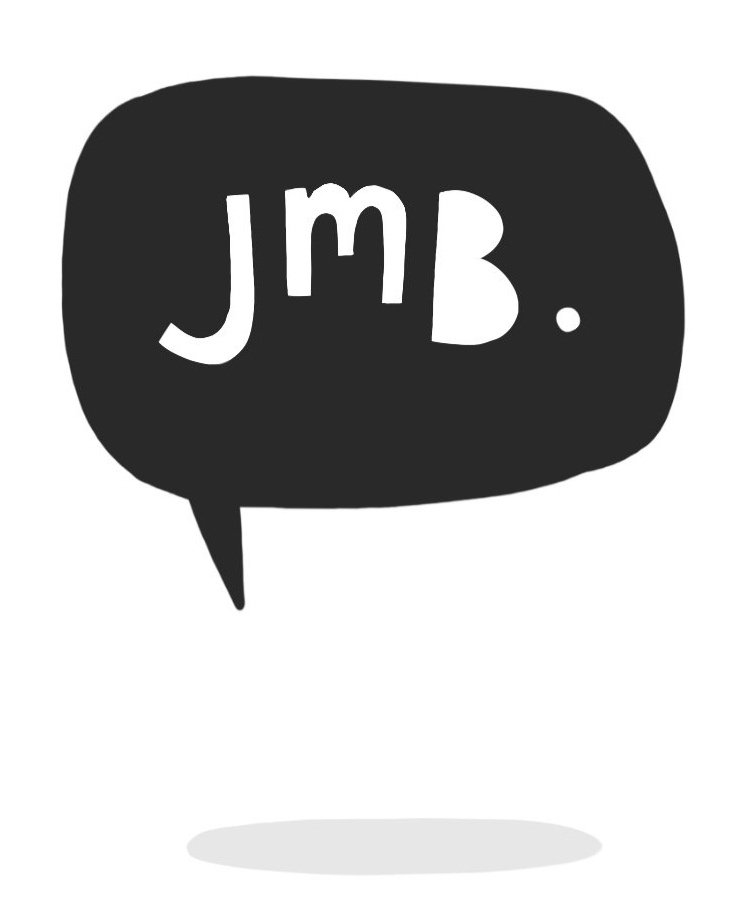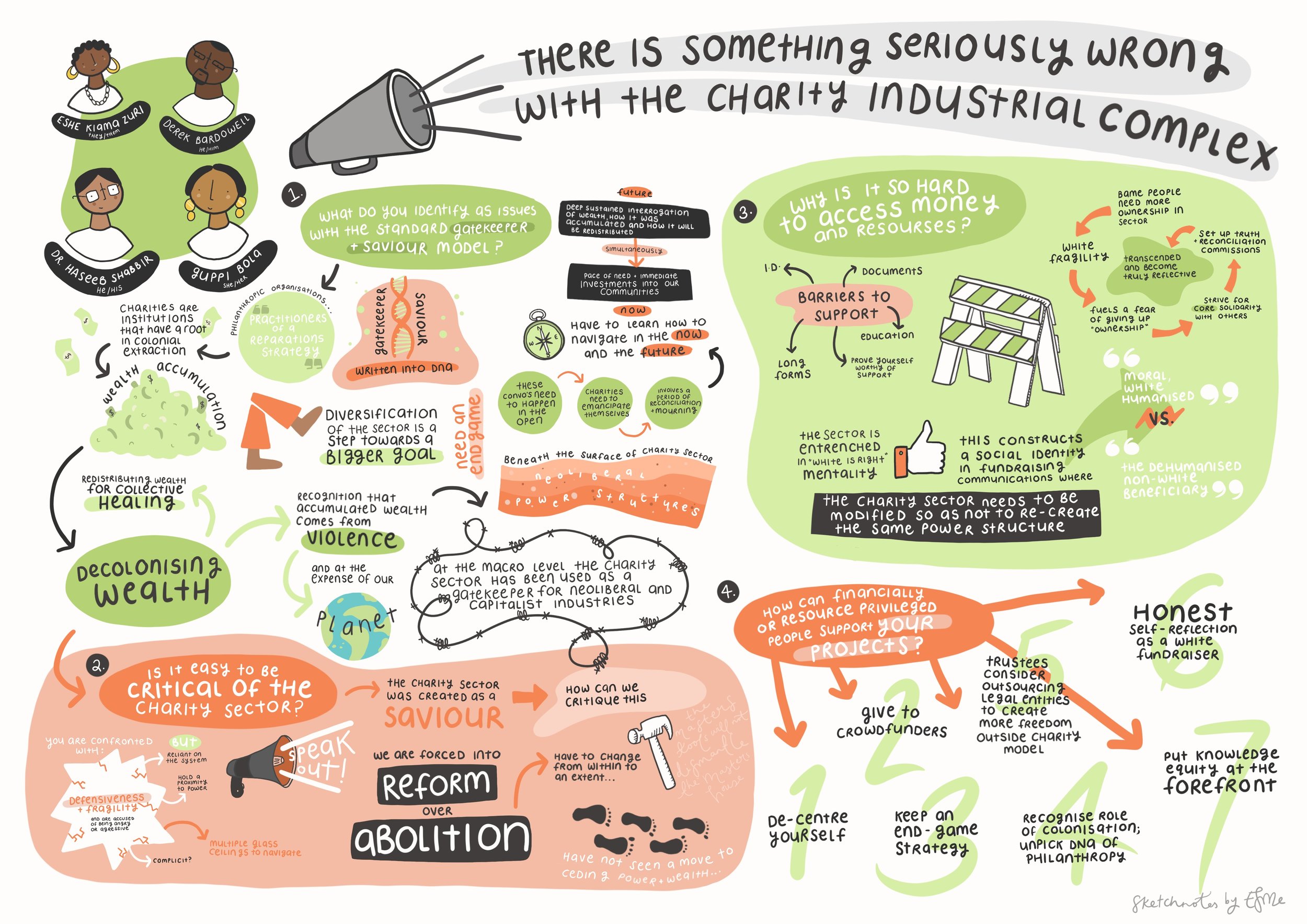On Nourishment by Evie Muir
I’m not a religious person. Yet, watching the BAME Online webinars, I found myself perched, knees crossed, palms clasped together as if in prayer. Back arched with my head intently leaning as close to my laptop as I could possibly get, I’d been mesmerised for the best part of two hours. Enchanted by a Eshe’s magnetism, their intentional sermons delivered the uncomfortable truths many are reluctant to confront. “I feel nourished” they say, and I notice myself nodding in solidarity. Same, I thought. In their two sessions, There Is Something Seriously Wrong with The Charity Industrial Complex and So We Did Our Own Thing, Eshe made their congregation felt held, seen, and heard. Joined by Derek Bardowell, CEO of Ten Years’ Time, Guppi Bola of Decolonising Economics, Dr Haseeb Shabbir, academic at the University of Hull, Jolliff Seville of Black Trans Foundation, Patricia Hamzahee, co-founder of The Black Funding Network, and Sumayyah Ibrahim, founding member of UK Mutual Aid, this online space engulfed its audience with the determined embrace shared between comrades in battle. What causes are we fighting for? The decolonisation of the Charity Industrial Complex, our safety within it and our right to operate outside of it.
But don’t charities do only good? I hear you wonder. This certainly is the illusion we’ve been led to believe. It is, admittedly, the reason I entered the charity sector, almost a decade ago. I wanted to serve my community, and I thought the charity sector was the only vehicle to do so. I’ve since advocated for hundreds of domestic abuse survivors and whilst I’d hope that they’re somewhat safer for my support, I’ve also witnessed unthinkable harm perpetrated from within the sector (the systematic neglect and revictimisation of trans and migrant survivors, plus the emotional abuse and racialised gaslighting of Black practitioners to name a few). I know the sector isn’t “good”. If it was, I wouldn’t feel consistently in fight mode, plagued by secondary trauma, feeling abandoned, without support. I found myself unable to shake the realisation that if charities were doing what they should be doing, then social injustices would be eradicated, and charities would no longer need to exist.
In the There is Something Seriously Wrong with the Charity Industrial Complex session, the colonial legacy within the sector was something all panellists agreed upon. “I think fundamentally we need to look at issues of wealth accumulation, and where and why certain institutions within society that have a root in colonial extraction and still have control of where wealth, power and resources are distributed”, says Guppi “the philanthropic model and the charity industrial complex are really central to that, and this is a real barrier to achieving the kind of equitable racial justice work we’re trying to create”.
Derek agreed. “It’s in the DNA [of the charity sector]” he says. “We’re all part of a system that we recognise as being wrong, and we’re all trying to change those dynamics from within, but the reality is – and if we’re going to get uncomfortable –that this wealth has been accumulated through the extraction and exploitation of people of colour, and at the expense of our planet”
But how do such ‘Big P’ Political constructs translate to systemic injustices on the ground? Sumayyah told us, “The more formal charities don’t understand when they’re engaging with our communities that they’re participating in a kind of social murder”. Through the gatekeeping of inequitable funding and resources, appropriation of knowledge, and the re-traumatisation and exploitation of marginalised workforces, the sector renders revolutionary change unattainable. Rather than the charity model, Guppi suggests, a community-focused model is foundational. “We need to remember that social justice, racial justice equity and reparations cannot be the role of charities” she says. “How the charity commission is set up is to intentionally depoliticise all institutions that are deemed as doing good in society, so we can’t see a charity as doing the transformative work that we need it to”.
As a domestic abuse practitioner, carrying this disillusionment (whilst also being dependent upon it on the sector to pay my bills) is lonely. Feeling like a pawn within a system that doesn’t really care about change, it was easy to relate to the panellist’s reflections on complicity, their loss of self, struggles with activist burnout and their own journey of negotiating macro and micro injustices.
The sentiments of freedom, liberation and reclamation communicated within the So We Did Our Own Thing session equally resonated. Determined to prove to myself that a place of safety could be forged for both myself and others, I founded Peaks of Colour, a Peak District-based walking club by and for people of colour. Committed to reclaiming space in the outdoors through intentional community care, we’re not only interested in exploring nature, but are also dedicated to exploring a decolonial practice that allows us to remain un-constituted and grass rooted – as far removed from the charity sector as possible.
Similarly, the Black Trans Foundation was also born from the recognition of an unmet need and a resistance to the status quo. Jolliff explains “what we’ve seen over the last year is a huge number of grassroots black organisations coming up and coming together, partially as a response to the weight of the racialised trauma that the Black community has experienced this year, globally. He continues, “historically the third sector has had a real problem with white saviour narratives and the idea of the benevolent charity that is not for or by a community but gives out of pure benevolence or virtue without really understanding what the needs of that community are.”
The impact that intentional, by and for communities have on activism represents the revolutionary act of coming home. In Sumayyah’s words “they’re lifesaving”. We reclaim agency over our own healing, allowing us to identify and meet our own needs. We permit ourselves the opportunity of self-sufficiency and mutual support, whilst having the autonomy to explore external options on our own terms without being reduced to grovelling, dependent, grateful, beneficiaries. We hold and we’re held tightly in a communal embrace, offering the nourishment we need to feel replenished, revitalised, and whole. Perhaps most importantly, we offer hope. It’s hope which keeps us fighting. The strength of a charity-less model is summed up in a powerful statement made by Eshe. “The charity sector is a colonial legacy and decolonising that legacy means bringing it back to community care” they say, “when we’re doing it for us, by us, we can access all the safety that we need”.
Tickets for #BAMEOnline 2022 are available now!


